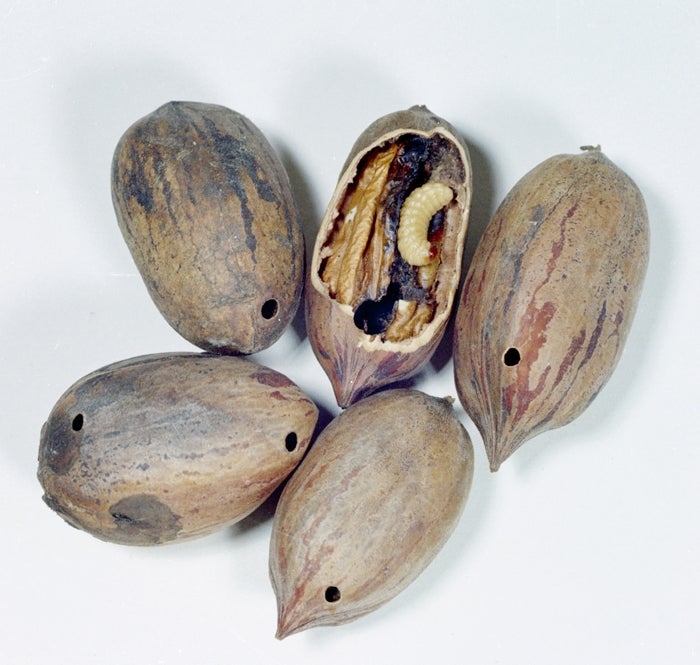Darrell Blackwelder: Problems with pecan trees
Published 12:00 am Friday, January 16, 2015

- University of Georgia Cooperative Extension Pecan weevils are responsible for small holes in the pecan shells. Many people have questions about pecan trees this year.
Generally, Extension agents receive only a few horticultural questions during and after the holidays. However, questions posed concerning pecans have dominated over the past few weeks. It’s obvious the poor crop affected desserts during the holidays. Poor quality nuts with little or no yield are the most common complaints concerning pecans.
Improper fertilization is an important factor in pecan production. Mature pecan trees often respond to applications of a complete fertilizer with zinc. Pecan fertilizers are custom blended ,containing zinc along with major and micro nutrients. These fertilizers are often found in garden shops and farm supply outlets and other retail outlets.
Even though fertilization is important, pecans face a multitude of problems especially with disease and insect pressures in our area. These problems are exacerbated with unseasonably wet, cool weather we’ve experience the past two summers. This type of weather may cause biennial bearing. Biennial bearing is when pecan trees may fall into a pattern of baring a heavy crop one year and lighter crop the next. Pear trees are another tree that has problems with biennial bearing. Unfavorable weather is usually the reason these trees fall into this cycle.
Pollination problems are another reason for no fruit. Flowers on pecan trees are diecious. In diecious flowers, the male and female flower parts are separated. Many pecan cultivars do not mature at the same time during the spring. Late frosts, heavy rainfalls during pollination or other physical factors often prevent adequate pollination. It is important to plant more than one pecan variety to increases chances of pollination.
Another problem with pecan production this year has been insects and diseases. Excessive rains and warm fall temperatures produce the perfect environment for pecan scab. Pecan scab is a very common fungal disease that is difficult to control. The disease coats the immature nuts and causes premature drop or does not allow nuts to mature.
Pecans often have holes in the hull or damaged kernals. Stink bugs and leaf‑footed stink bugs are the culprits of this type of damage. These insects feed on the kernels when the shell is hardening and black orchocolate colored stains appear on nuts later. This is often referred to as biter pit.
Many stink bug species over‑winter in orchard debris (leaves and spend nut casings). Reduce broadleaf weeds underneath the tree.
It is impractical to spray large trees for insect and disease problems. Rake up infected nuts and leaves and if possible, burn to eliminate re-infection of next year.
Darrell Blackwelder is county Extension director for the N.C. Cooperative Extension. Call 704-216-8970.




